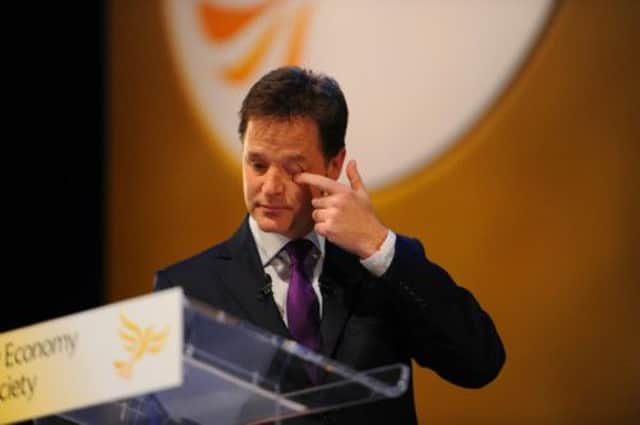Nick Clegg: Bedroom tax review in progress


Deputy Prime Minister Nick Clegg told MPs yesterday that research was needed into the tax to find out whether tenants could opt to take a smaller house or flat to avoid a deduction in their benefits.
The tax has faced fierce criticism from opposition parties because of the way that many disabled people and others who need extra care will be forced out of their homes.
Advertisement
Hide AdAdvertisement
Hide AdThe SNP has already promised to repeal it if Scotland votes Yes to independence and in the joint ministerial council (JMC) today at Downing Street Alex Salmond will demand the UK government reverses the controversial policy.
Speaking ahead of the JMC, the First Minister said: “We have consistently argued that decisions about Scotland should be taken by the people who live and work here.
“The Scottish Government rejects the bedroom tax which penalises the poor and vulnerable in our communities.
“Over 82,000 households in Scotland are seeing housing benefit payments cut under the UK government’s under occupancy rules and around 80 per cent of those are homes to disabled adults. Over 15,000 of those affected are families with children.”
The policy was pushed through by Work and Pensions Secretary Iain Duncan Smith to end the subsidy on spare bedrooms paid to people who live in social housing but not available for people on housing benefit in private accommodation.
Under the reforms, tenants with one spare bedroom have had a payment reduction of 14 per cent and those deemed to have two or more spare have seen their benefits cut by 25 per cent. For special cases, councils have been handed a discretionary housing fund to help tenants pay their rent.
Labour claims that because there is such a shortage of smaller properties, many tenants cannot downsize and the fund is inadequate.
Labour deputy leader Harriet Harman said the shortage in social housing means only one in 25 households affected by the spare room subsidy can actually choose a smaller property without an extra bedroom.
Advertisement
Hide AdAdvertisement
Hide AdYesterday, Mr Clegg told the House of Commons he suspected the problem varied across the UK and revealed a review was now under way to determine the impact of the government policy.
He said: “Of course, I accept there will be cases where for some households this change from one system to another creates real dilemmas which need to be addressed through the money we are making available to local authorities.
“To be honest, I have seen lots of widely different figures being cited about the impact of this policy – that is why we are commissioning independent research to exactly understand the impact of this.
“I suspect it varies enormously between one part of the country and another, and one local authority and another. That is why we are trebling, as I say, the resources we are making available to local authorities.”
Mr Clegg’s comments came after a question from Ms Harman. She asked Mr Clegg: “What you don’t want to admit, obviously, is that for 96 per cent of tenants there isn’t a smaller home to go to and so it is no wonder that the councils are saying that the discretionary housing fund on that basis is completely inadequate to help all the families who can’t move and are falling into arrears.”